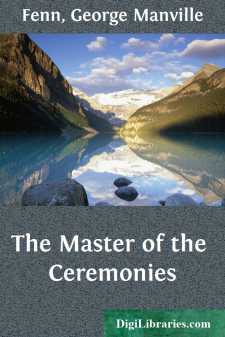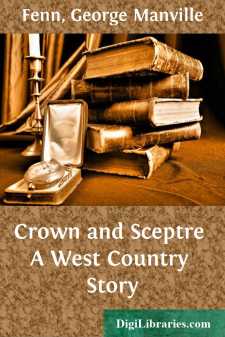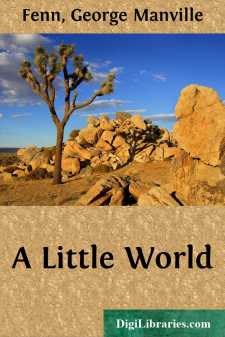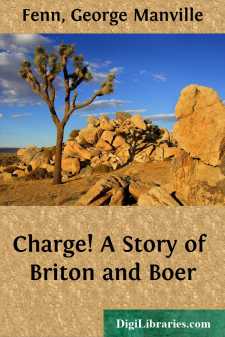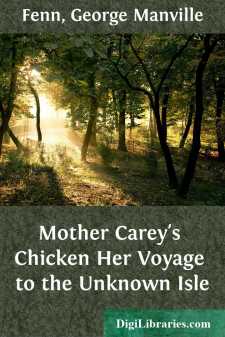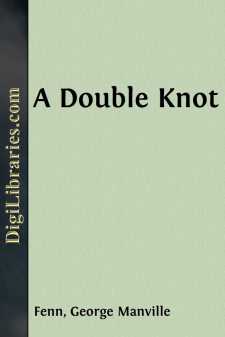Categories
- Antiques & Collectibles 13
- Architecture 36
- Art 48
- Bibles 22
- Biography & Autobiography 815
- Body, Mind & Spirit 144
- Business & Economics 28
- Children's Books 18
- Children's Fiction 14
- Computers 4
- Cooking 94
- Crafts & Hobbies 4
- Drama 346
- Education 58
- Family & Relationships 59
- Fiction 11833
- Games 19
- Gardening 17
- Health & Fitness 34
- History 1378
- House & Home 1
- Humor 147
- Juvenile Fiction 1873
- Juvenile Nonfiction 202
- Language Arts & Disciplines 89
- Law 16
- Literary Collections 686
- Literary Criticism 179
- Mathematics 13
- Medical 41
- Music 40
- Nature 179
- Non-Classifiable 1768
- Performing Arts 7
- Periodicals 1453
- Philosophy 65
- Photography 2
- Poetry 896
- Political Science 203
- Psychology 44
- Reference 154
- Religion 515
- Science 126
- Self-Help 85
- Social Science 82
- Sports & Recreation 34
- Study Aids 3
- Technology & Engineering 59
- Transportation 23
- Travel 463
- True Crime 29
George Manville Fenn
George Manville Fenn was a prolific English author, born on January 3, 1831, and died on August 26, 1909, known for his numerous adventure novels and stories for young readers. He worked as a schoolmaster and journalist before turning to writing full-time, producing over 160 books during his career. Fenn's works often featured themes of exploration, survival, and moral lessons, appealing to the Victorian era's fascination with adventure and education.
Author's Books:
Sort by:
A Boy at Sea. Many many years ago seem like yesterday, and I hope it will always be the same. For, just to be serious for a moment, what is the full stretch of the oldest man’s life to time? Just one star-wink, if the astronomers are right about the passage of light, and that the glitter of stars that we see now are only the rays which started from them away there in space long before we were born....
more...
His House. Early morning at Saltinville, with the tide down, and the calm sea shimmering like damasked and deadened silver in the sunshine. Here and there a lugger was ashore, delivering its take of iris-hued mackerel to cart and basket, as a busy throng stood round, some upon the sands, some knee-deep in water, and all eager to obtain a portion of the fresh fish that fetched so good a price amongst...
more...
In the West Countree. “Derry down, derry down, derry down!” A cheery voice rolling out the chorus of an old west-country ditty. Then there was a run of a few yards, a sudden stoppage, and a round, red missile was thrown with considerable force after a blackcock, which rose on whirring wings from among the heather, his violet-black plumage glistening in the autumn sun, as he skimmed over the moor,...
more...
Duplex Street. “Some people are such fools!” said Richard Pellet; and, if public judgment was right, he knew what a fool was as well as any man in the great city of London. He was a big man was Richard Pellet, Esq., C.C., shipper, of Austin Friars, and known among city men as “the six-hundred-pounder;” and he knew a fool when he saw one. But whether at his office in the city, or down at his...
more...
Home, Sweet Home. “Hi! Val! Come, quick!” “What’s the matter?” I said excitedly, for my brother Bob came tearing down to the enclosure, sending the long-legged young ostriches scampering away towards the other side; and I knew directly that something unusual must be on the way, or, after the warnings he had received about not startling the wild young coveys, he would not have dashed up like...
more...
Down in Devon. âThen youâre a villain!â âNonsense, Mary; be reasonable.â âReasonable, Captain Armstrong! I am reasonable, and I am telling you the truth. You are a villain!â âWhy, you foolish girl, what did you expect?â âThat you would be an officer and a gentleman. Once more, is it true that you are going to be married to that lady?â âWell,...
more...
A Peep at Tolcarne. “Ed—Ward!” “Yes, mum.” A stiff, high-shouldered footman turned round as he reached the breakfast-room door. “Are you sure Sir Hampton has been called?” “Yes, mum.” “And did Smith take up her ladyship’s hot water?” “Yes, mum.” “Are the young ladies coming down?” “They went out for a walk nearly an hour ago, mum.” “Dear me! and such a damp...
more...
How Mark Strong wanted to go. “Go with me, Mark? What for? To live hard, work hard, and run the risk every day of having to die hard. Get out! You’re as bad as your mother.” “Not very bad, is it, James, to wish to share my husband’s life and cares?” Captain Strong put down his pipe, got up from his easy-chair, crossed to the other side of the fire, and laid his hand upon Mrs Strong’s...
more...
In Wimpole Street. Sam—or, as he liked to be called, “Mr Samuel,” or “Mr Downes,” holding as he did the important post of confidential and body-servant to Dr Robert Morris, a position which made it necessary for him to open the door to patients and usher them into the consulting-room, and upon particular occasions be called in to help with a visitor who had turned faint about nothing—“a...
more...
A Daughter of Eve. “Mother!” There was no reply, and once again rose from the bed in the prettily-furnished room the same word—“Mother!” The wild, appealing, anguished cry of offspring to parent, seeming to ask for help—protection—forgiveness—the tenderness of the mother-heart to its young, and still there was no answer. The speaker struggled up so that she rested on her elbow, the...
more...



